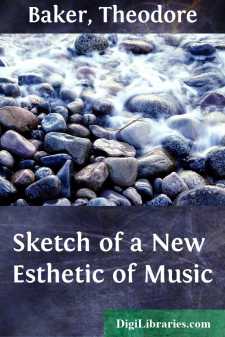Categories
- Antiques & Collectibles 13
- Architecture 36
- Art 48
- Bibles 22
- Biography & Autobiography 813
- Body, Mind & Spirit 142
- Business & Economics 28
- Children's Books 17
- Children's Fiction 14
- Computers 4
- Cooking 94
- Crafts & Hobbies 4
- Drama 346
- Education 46
- Family & Relationships 57
- Fiction 11829
- Games 19
- Gardening 17
- Health & Fitness 34
- History 1377
- House & Home 1
- Humor 147
- Juvenile Fiction 1873
- Juvenile Nonfiction 202
- Language Arts & Disciplines 88
- Law 16
- Literary Collections 686
- Literary Criticism 179
- Mathematics 13
- Medical 41
- Music 40
- Nature 179
- Non-Classifiable 1768
- Performing Arts 7
- Periodicals 1453
- Philosophy 64
- Photography 2
- Poetry 896
- Political Science 203
- Psychology 42
- Reference 154
- Religion 513
- Science 126
- Self-Help 84
- Social Science 81
- Sports & Recreation 34
- Study Aids 3
- Technology & Engineering 59
- Transportation 23
- Travel 463
- True Crime 29
Sketch of a New Esthetic of Music
by: Theodore Baker
Description:
Excerpt
SKETCH OF A NEW ESTHETIC OF MUSIC
“What seek you? Say! And what do you expect?”—know not what; the Unknown I would have!
What's known to me, is endless; I would go
Beyond the end: The last word still is wanting.”[“”]
Loosely joined together as regards literary form, the following notes are, in reality, the outcome of convictions long held and slowly matured.
In them a problem of the first magnitude is formulated with apparent simplicity, without giving the key to its final solution; for the problem cannot be solved for generations—if at all.
But it involves an innumerable series of lesser problems, which I present to the consideration of those whom they may concern. For it is a long time since any one has devoted himself to earnest musical research.
It is true, that admirable works of genius arise in every period, and I have always taken my stand in the front rank of those who joyfully acclaimed the passing standard-bearers; and still it seems to me that of all these beautiful paths leading so far afield—none lead upward.
The spirit of an art-work, the measure of emotion, of humanity, that is in it—these remain unchanged in value through changing years; the form which these three assumed, the manner of their expression, and the flavor of the epoch which gave them birth, are transient, and age rapidly.
Spirit and emotion retain their essence, in the art-work as in man himself; we admire technical achievements, yet they are outstripped, or cloy the taste and are discarded.
Its ephemeral qualities give a work the stamp of “modernity;” its unchangeable essence hinders it from becoming “obsolete.” Among both “modern” and “old” works we find good and bad, genuine and spurious. There is nothing properly modern—only things which have come into being earlier or later; longer in bloom, or sooner withered. The Modern and the Old have always been.
CHARACTERIZATION OF THE ARTSArt-forms are the more lasting, the more closely they adhere to the nature of their individual species of art, the purer they keep their essential means and ends.
Sculpture relinquishes the expression of the human pupil, and effects of color; painting degenerates, when it forsakes the flat surface in depiction and takes on complexity in theatrical decoration or panoramic portrayal.
Architecture has its fundamental form, growth from below upward, prescribed by static necessity; window and roof necessarily provide the intermediate and finishing configuration; these are eternal and inviolable requirements of the art.
Poetry commands the abstract thought, which it clothes in words. More independent than the others, it reaches the furthest bounds.
But all arts, resources and forms ever aim at the one end, namely, the imitation of nature and the interpretation of human feelings.
*
**
Architecture, sculpture, poetry and painting are old and mature arts; their conceptions are established and their objects assured; they have found the way through uncounted centuries, and, like the planets, describe their regular orbits.
Music, compared with them, is a child that has learned to walk, but must still be led. It is a virgin art, without experience in life and suffering.
It is all unconscious as yet of what garb is becoming, of its own advantages, its unawakened capacities. And again, it is a child-marvel that is already able to dispense much of beauty, that has already brought joy to many, and whose gifts are commonly held to have attained full maturity.
*
**
Music as an art, our so-called occidental music, is hardly four hundred years old; its state is one of development, perhaps the very first stage of a development beyond present conception, and we—we talk of “classics” and “hallowed traditions”! And we have talked of them for a long time!
We have formulated rules, stated principles, laid down laws;—we apply laws made for maturity to a child that knows nothing of responsibility!
*
**
Young as it is, this child, we already recognize that it possesses one radiant attribute which signalizes it beyond all its elder sisters....


